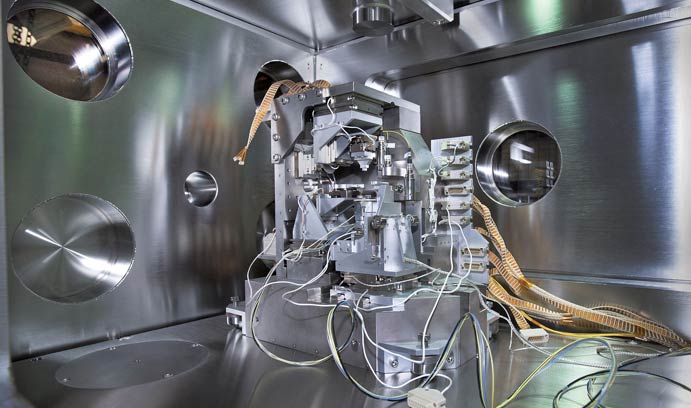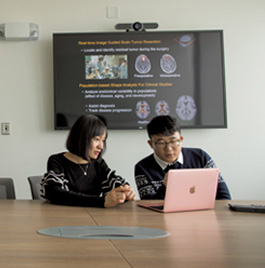Partnerships to Advance Research

The Hard X-ray Nanoprobe (HXN) at the National Synchrotron Light Source II (NSLS-II) at Brookhaven National Laboratory
Photo: Brookhaven National Laboratory
The National Synchrotron Light Source (NSLS-II), located within the Brookhaven National Laboratory in New York, is one of the world’s most advanced synchrotrons. A state-of-the-art, medium-energy electron storage ring, it provides extremely powerful electromagnetic radiation that enables researchers to study the fundamental properties of matter on a scale not previously possible.
Lehigh in April announced a new long-term collaborative partnership with NSLS-II, which will help advance the research of Lehigh faculty, as well as help inform Brookhaven National Lab about the needs of university researchers.
“[Brookhaven National Lab] has some of the most advanced tools of materials research anywhere in the world, so it would be natural for us to start partnering with Brookhaven,” said Himanshu Jain, the T.L. Diamond Distinguished Chair in Engineering and Applied Science and professor of materials science and engineering. “Our colleagues at Brookhaven have been very receptive. We are very grateful to them.”
Lehigh earlier this year hosted a workshop to kick off the new partnership with NSLS-II. Scientists from NSLS-II presented to more than 60 faculty members, postdoctoral researchers and graduate students, and Lehigh research teams provided user perspective on synchrotron-supported research. Later, a group of 16 Lehigh faculty, graduate students and research scientists in May visited NSLS-II to gain firsthand understanding of the facility that will help them design appropriate experiments.
“We believe strongly that there is great potential for NSLS-II being able to contribute crucially to the research performed at Lehigh,” said Juergen Thieme, science coordinator for the Imaging and Microscopy Program in the Photon Division at Brookhaven. “The workshop at Lehigh and the visit to NSLS-II resulted already in individual contacts about experiments between faculty members and beamline staff. Our goal is to solidify these contacts and make them parts of a larger collaboration between our two institutions.”
The announcement of the NSLS-II partnership came just after the university’s announcement of the formation of three Interdisciplinary Research Institutes (IRIs). These Institutes, supported by Lehigh’s commitment of more than $150 million toward interdisciplinary research and education, will facilitate the growth of research teams and catalyze critical research that will have lasting societal impact. Jain serves as director of one of the three IRIs, the Institute for Functional Materials and Devices (I-FMD).
“Our IRI is an attempt to assemble the faculty, identify our strengths and see how we can make a broad impact on society,” said Jain. “We would like to at the same time enhance the quality and the variety of research by the Lehigh faculty and graduate students.”
Part of that effort involves partnerships with industry and national research facilities, as evidenced by the NSLS-II collaboration.
“We recognize that there is expertise in national facilities and, additionally, we will be wanting to partner with companies which know society’s needs better than universities. They know what the market is, they follow market needs. … [National laboratories] often have a bigger picture than we do as individuals at the university. So we were looking for a partnership with these major components of technological development in the country: the national labs, the companies, the universities. This is what the IRIs are trying to do.”
The themes and structure of the three inaugural IRIs were developed through a faculty-led envisioning process initiated in the P.C. Rossin College of Engineering and Applied Science, with input and faculty participation from across the university. In addition to the Institute for Functional Materials and Devices, the IRIs include the Institute for Data, Intelligent Systems, and Computation (I-DISC) and the Institute for Cyber-Physical Infrastructure and Energy (I-CPIE).
“Our envisioning process engaged the campus community to help determine the areas in which Lehigh can most broadly impact society,” said Stephen P. DeWeerth, professor and dean of P.C. Rossin College of Engineering and Applied Science. “The IRIs that resulted from this process bring together faculty members, students and partners to address challenging research problems, and provide productive learning environments for this work to take place. By incubating and catalyzing these teams of scholars addressing fundamental and applied research in areas of broad societal importance, the Institutes will enable Lehigh to lead on the national and international stage.”
Posted on:





